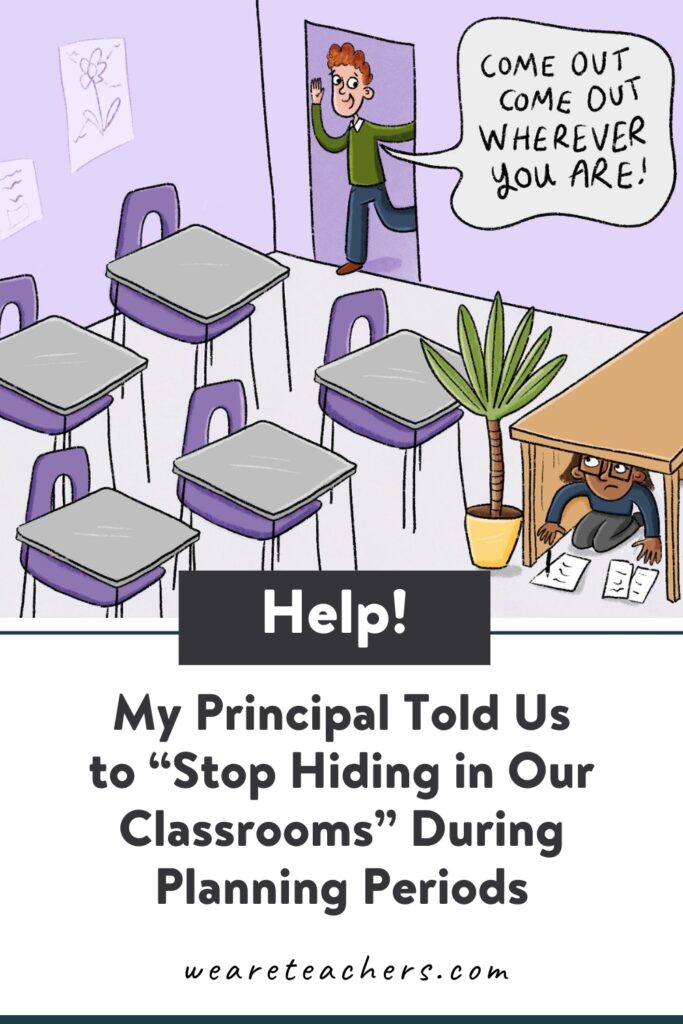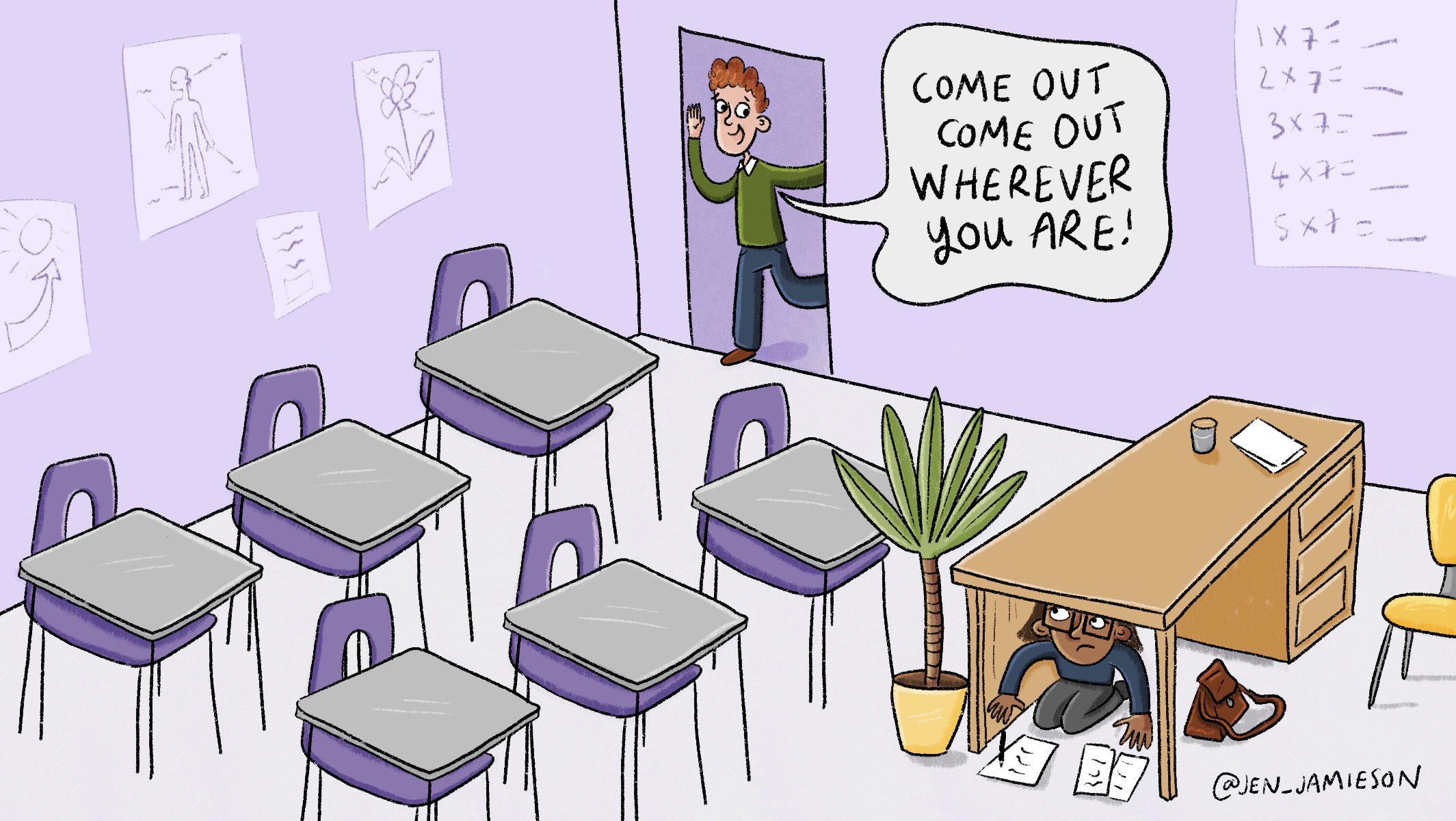Dear WeAreTeachers,
At our last faculty meeting, our principal told us we should “stop hiding in our rooms” during our planning periods, explaining we should be networking with each other and socializing with students if we’re not teaching. He said this would help create a “lively, social atmosphere.” I’m the math department chair and feel responsible for passing along to the principal that my entire department was livid at his suggestion at our meeting this morning. My coworkers rightly pointed out that our planning period is our only real time during contract hours to get work done or take a breath from the rest of our already “lively, social” day in our classrooms. Do I tell my principal his idea has been received as insulting and counterproductive, or wait for this initiative to crash and burn on its own? —Networking Hard, or Hardly Networking?
Dear N.H.O.H.N.,
Do you know how this new initiative will be enforced? Having a conversation with your principal hinges on how serious he is about patrolling for violators. If your principal is checking to see whether teachers follow through, I think you have an obligation as the department chair to let him know this decision was received by your department as being a little out of touch with the nature and needs of being a teacher (OK, a lot out of touch). If there’s no known plan for following through, just carry on hiding in your room as usual. This isn’t the first (and won’t be the last) time a school-wide directive fizzled out like a dud firework.
Dear WeAreTeachers,
I’m the English department chair at my school. We were at a conference at a hotel last week when I overheard two teachers loudly talking about me next door. I guess the connected door didn’t do a whole lot, because I could hear every mean word perfectly, from comments about my appearance to the way I run the department. My feelings are hurt. Is that enough reason to justify confronting these two teachers about it?—Sticks and Stones
Dear S.A.S.,
First of all, I’m sorry this happened. Overhearing that conversation would hurt anyone’s feelings. You showed a lot of restraint and poise by not busting down the connecting door in that moment.
Personally, I think they both need a wake-up call (no hotel pun intended). When you’re on school business, mean gossip about a coworker loud enough to be heard through a wall is not a good look for the school or the district. It’s lucky for them that you were in the room next door and not your superintendent or a well-connected parent.
I think you approach them with heart. Say that while the conversation hurt your feelings, you were also surprised that they’ve never shared negative feedback with you about your leadership. Be aware and open to the possibility that this could lead to a conversation about them maybe feeling unheard or dismissed in the past. But hopefully it will also lead to a giant apology on their part (and gratitude that you didn’t put the principal on speakerphone from your hotel room).
Dear WeAreTeachers,
One of my fifth graders, Ethan, is constantly irritating the other boys in class. Ethan makes fun of their interests and clothes, steps on the backs of their shoes while in line, won’t contribute to group work, little things like that. As a result, these boys—understandably—don’t include him at recess or rush to partner with him for projects. Ethan’s mom says I have something against Ethan and am “enabling bullying to take place” because the other boys “strategically isolate” him. A conversation seems impossible—how do I tell a mother that I understand why the other kids don’t like your son? —Questioning My Judgment
Dear Q.M.J.,
This is a very complicated social situation with multiple angles to consider. I have empathy for everyone involved. For you, as a teacher who feels overwhelmed. For Ethan, who wishes he had friends at school and is maybe oblivious that his behavior is contributing to it. For the boys in his class, who are regularly subjected to a classmate that makes them feel bad. And for the mom, who sees her own child in pain. All of these feelings are valid.
This issue is about friendship, but it’s also about boundaries. It sounds like the whole class could use a refresher. Everyone needs to know how to set a boundary when someone is bothering you, and explicit instruction on what that language actually sounds like (e.g. “Stop stepping on my shoe.”). Everyone (but Ethan in particular) needs to know the appropriate response when someone else sets a boundary.
Finally, everyone needs to know the consequences for not respecting someone else’s boundary—consequences from you as well as social consequences. Fill in Ethan’s mom on all of this, and explain that you hope having clear language and expectations for him will help him succeed socially. If he’s struggling after this, you can structure future conversations—with him and with Mom—around a framework you’re all familiar with.
Dear WeAreTeachers,
I was honored when my principal said he picked me as his son’s 3rd grade teacher this year, but I’m struggling with his behavior and disrespect on a daily basis. He usually manages to toe the line just short of any office-referral-level offenses, but the last straw was when he asked inappropriate questions of our guest speaker. He told me, “What are you going to do, send me to my dad?” It feels really awkward to approach my boss with my concerns about the behavior of a child he raised. Any tips? —Biting the Feeding Hand



